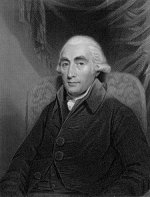|
 Joseph Black, born on April 16, 1728 in Bordeaux, France, was a physicist and chemist. His father came from Belfast, Ireland and his mother from Aberdeenshire, Scotland. His father was a merchant in the wine trade, which is why he was born in France. Joseph Black, born on April 16, 1728 in Bordeaux, France, was a physicist and chemist. His father came from Belfast, Ireland and his mother from Aberdeenshire, Scotland. His father was a merchant in the wine trade, which is why he was born in France.
Black’s education began at the University of Glasgow at the age of eighteen. After four years, he entered the University of Edinburgh to study medicine. His thesis, Experiments upon Magnesia Alba, Quicklime, and Some Other Alcaline Substances, was published two years later in 1756. The work included important discoveries for chemistry that helped lead to many modern scientific ideas and techniques.
Black performed quantitative experiments of heating magnesia alba. Through his careful measurements, he discovered that the substance lost mass after heating. He determined that a kind of air was being released. He knew it was different from ordinary air and called it fixed air. What he had discovered was carbon dioxide. He called magnesia alba a mild alkali and distinguished these types of compounds from caustic alkalis.
Prior to Black’s experiments, chemists believed that when mild alkalis were heated, they reacted by the absorption of a particle called phlogiston. His studies helped to disprove the existence of phlogiston.
In 1756, Black moved back to Glasgow to become a professor of anatomy and chemistry. At this time, he began to study thermodynamics in a quantitative manner. He found that different substances could absorb different amounts of heat. This is now called heat capacity, the amount of heat a certain mass of substance absorbs per degree Celsius change in temperature.
In other thermodynamic experiments, Black discovered that when ice melts, it absorbs a certain amount of heat without changing temperature. He realized that the heat must be transferred to some other form of energy in the ice. He called this latent heat. He also calculated an accurate value for the heat of vaporization of water, the energy required to vaporize a given amount of liquid water.
James Watt, a friend of Black’s and fellow professor at the University of Glasgow, used his thermodynamic research to develop steam-powered engines. Black also developed the first analytical balance using a beam balanced on a fulcrum, with two pans on either side. It was far more accurate than any other scale in use at the time and became common in all chemistry laboratories.
Joseph Black devoted his life to his work and his colleagues and friends. He never married and died in 1799 at the age of 71. He was buried in the Greyfriars Kirkyard in Edinburgh.
Image: Mezzotint engraving after Sir Henry Raeburn of Joseph Black
|